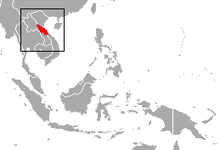- Southern white-cheeked gibbon
-
Southern white-cheeked gibbon[1] Conservation status Scientific classification Kingdom: Animalia Phylum: Chordata Class: Mammalia Order: Primates Superfamily: Hominoidea Family: Hylobatidae Genus: Nomascus Species: N. siki Binomial name Nomascus siki
(Delacour, 1951)
Southern White-cheeked Gibbon range The southern white-cheeked gibbon (Nomascus siki) is a species of gibbon native to Vietnam and Laos. It is closely related to the northern white-cheeked gibbon (Nomascus leucogenys) and the yellow-cheeked gibbon (Nomascus gabriellae); it has previously been identified as a subspecies of each of these, and may potentially be a hybrid of the two rather than a separate species in its own right.
Contents
Description and habitat
Members of the species are not a uniform colour; unweaned juveniles are a light brown, turning to black after weaning. Adult males remain black, but adult females are brown. The name of the species is taken from the male's facial markings, a large patch of white fur around the edge of the mouth - this distinguishes it from a male of N. leucogenys, which has the white in a streak along the cheeks. Females have a thin edging of white around the face.[3]
The species lives in lowland broadleaf forest, with some populations living in forested mountainous areas. As with all gibbons, they are arboreal and frugivorous.[2]
The habitat covers an area of central Vietnam and in southern Laos, ranging between 17 and 19 degrees north latitude. Between 19 and 20 degrees there is an area of overlap inhabited by both N. siki and N. leucogenys; south of 17 degrees was traditionally believed to contain populations of N. siki, but is now thought to contain only N. gabriellae.[2]
The species is widespread throughout its range in Laos, but in Vietnam the populations are scattered due to human encroachment on their habitat for logging and farming. Numbers are thought to have declined by 50% over the last 45 years, and the species is classed as endangered; it is legally protected in Vietnam, but this is not effectively enforced outside of protected areas.[2]
Taxonomy
The species was first formally identified in 1951 by Jean Théodore Delacour. It had previously been considered to be a subspecies of variously N. leucogenys, N. gabriellae or N. concolor.[2] The original assignation of N. siki as a subspecies of N. gabriellae was due to the interpretation of a single baculum, but later research indicated that the specimen was part of a different species. It was then assigned to N. leucogenys due to similarities of its song, as well as strong visual similarities between the females of the two species.[4] However, it has been considered a separate species since 2001.[1]
There are some indications that the species may be a hybrid of N. leucogenys and N. gabriellae; it occupies a range sited between the two populations, and there are reports of N. siki interbreeding with N. gabriellae. To further complicate the issue, in the north of its range, the population mingles with that of N. leucogenys, whilst in the south, there is a large area where the population phenotypically resembles N. gabriellae but has a song distinct from the main population of either species. These latter group are currently classed as N. gabriellae.[2]
References
- ^ a b Groves, C. (2005). Wilson, D. E., & Reeder, D. M, eds. ed. Mammal Species of the World (3rd ed.). Baltimore: Johns Hopkins University Press. OCLC 62265494. ISBN 0-801-88221-4. http://www.bucknell.edu/msw3/browse.asp?id=12100783.
- ^ a b c d e f Manh Ha, N., Rawson, B., Geissmann, T. & Timmins, R.J. (2008). Nomascus siki. In: IUCN 2008. IUCN Red List of Threatened Species. Downloaded on 20 March 2009.
- ^ Groves, Colin. Speciation and biogeography of Vietnam’s primates. Vietnamese Journal of Primatology (2007) 1, 27-40. Digital copy
- ^ Geissmann, Thomas (December 1995). "Gibbon systematics and species identification" (PDF). International Zoo News 42: 472. http://gibbons.de/main/papers/pdf_files/1995gibbon_systematics_big.pdf. Retrieved 2008-08-15.
External links
Extant species of family Hylobatidae (Gibbons) Hylobates Hoolock Symphalangus Nomascus Northern buffed-cheeked gibbon (N. annamensis) · Black crested gibbon (N. concolor) · Eastern black brested gibbon (N. nasutus) · Northern white-cheeked gibbon (N. leucogenys) · Yellow-cheeked gibbon (N. gabriellae) · Southern white-cheeked gibbon (N. siki)CategoryCategories:- IUCN Red List endangered species
- Mammals of Southeast Asia
- Mammals of Laos
- Fauna of Vietnam
- Gibbons
- Animals described in 1951
Wikimedia Foundation. 2010.

